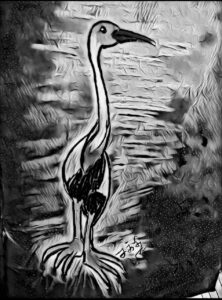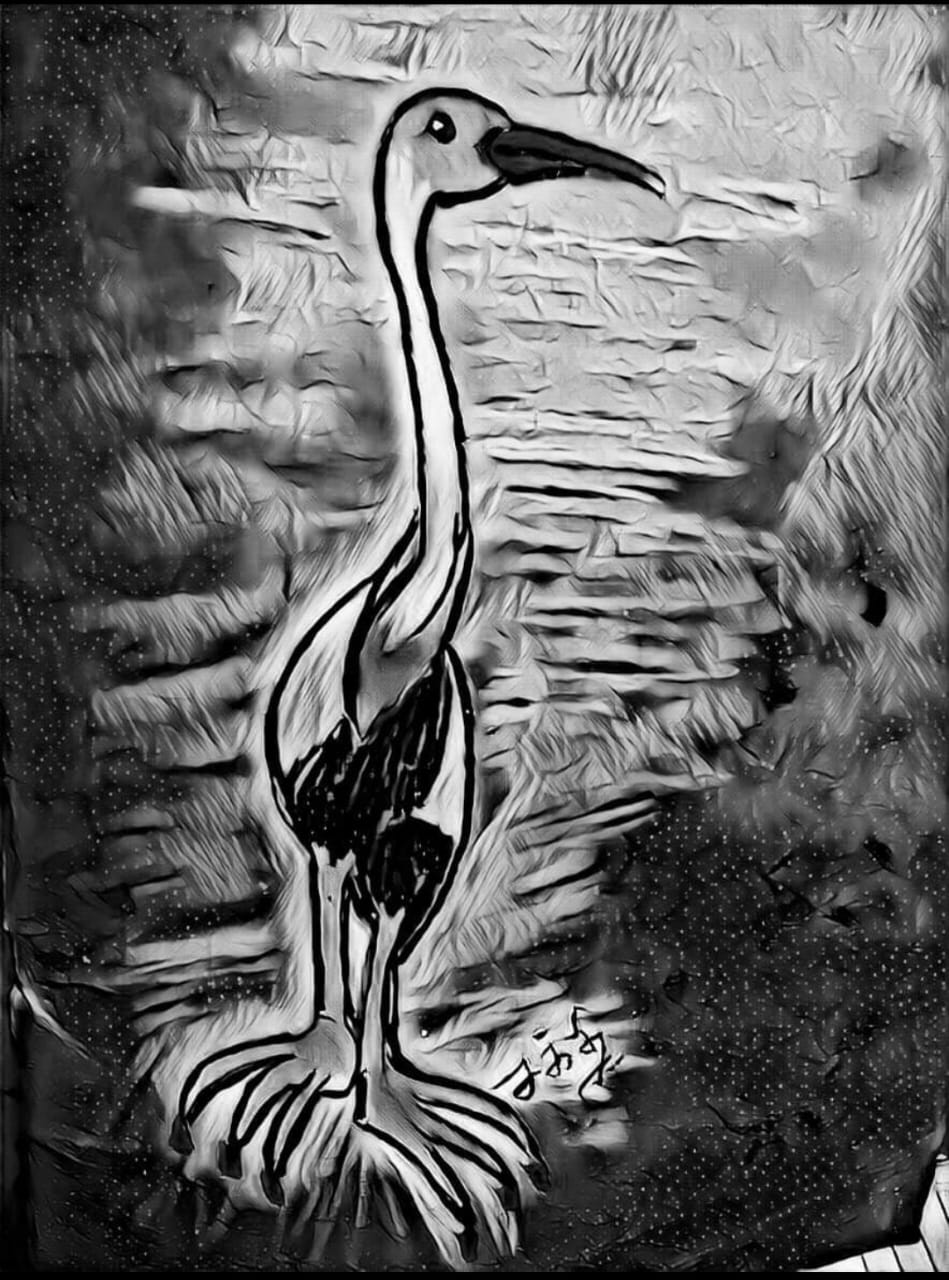Poems by SUKIRTHARANI, ILAMPIRAI, and SAKTHI ARULANANDHAM
Translated from the Tamil by THILA VARGHESE
Table of Contents:
- Sukirtharani, “For the sake of living”
- Ilampirai, “Loot”
- Sakthi Arulanandham, “Land Grabbing Bird”

Drawing by Sakthi Arulanandham for her poem “Land Grabbing Bird.”
Marutha Nilam (The agricultural and plains region)
For the sake of living
By Sukirtharani
In the courtyard filled with
bubbling water flowing from
the palm-leaf thatched roof
during monsoons,
grew a golden shower tree.
On that tree, yellow flowers
bloomed in clusters.
There was a nest on the tree
where sparrows with short beaks
would be chirping incessantly.
Sitting under the shade of the tree,
I would be studying passers-by.
Nowadays,
there is no rain,
and no tree either.
No feathers of sparrows
have been shed on the ground.
No one is walking around here.
With an aching soul,
I look at the scene from afar.
A bypass cuts across
my home with a palm-leaf thatched roof.
Loot
By Ilampirai
I was flying
like a bird
slightly larger than
a dragonfly.
Traces of river tracks
were shimmering
terminally on earth
like grey hair
waiting to shed any moment.
Fallen feathers of birds
and the last dry leaves of trees
were embedded in the stickiness
of rocks, softened in heat
risen to a boiling point.
The earth was like
a rolled bale of straw
laid in front of people
who were exhausted
from plundering the land
and were trickling down
individually
as burning incense sticks.
Before the bale got ignited,
I woke up in a panic.
At a distance was heard
the constant sound of explosives
shattering the mountains.
Land Grabbing Bird
By Sakthi Arulanandham
It is a dreadful bird
that turns every path it travels
into a desert.
When it spreads out its pair of long wings,
innumerable small wings follow suit.
When all of them are outspread together,
the sound that emerges
resonates as thunderous noise.
In the darkness of its shadow
that stretches out,
the green pigment
of great forests sloughs off.
In its heat-emitting
gusty sigh,
mountains are pulverized.
The soil itself is charred
and becomes barren.
The bird’s little eyes are narrowed,
brimming with treachery…
All they zero in on
are its prey.
With the swiftness and dexterity
of a hawk that pounces upon a chicken
and takes it by force,
the bird craves
snapping up a vast terrain
with its powerful, sharp beak
and flying away with it.
When that turns out to be impossible,
in the heat of its great big sigh,
all the rivers dry up.
They christened that nameless, gargantuan bird
Greed.
These translations were done with the support of the 2024 ALTA Emerging Translator Mentorship Program.
Sukirtharani, a teacher by profession, is the author of nine poetry books. A feminist and a social activist, Sukirtharani speaks out against oppression of women and caste-based discrimination through her poems that focus on pressing social issues and environmental degradation. Drawn from lived experiences of marginalized communities, Sukirtharani’s poems challenge caste hierarchies and patriarchal norms in Indian society. A recipient of numerous literary awards, Sukirtharani actively participates in regional, national, and international forums to engage in the ongoing dialogue on gender imbalance and social inequality
Ilampirai, the headmistress of a government school, is the author of eight poetry books and two collections of essays. Rooted in lived experience, her poems reflect nostalgia for rural life, contrasting it with life in the city. Prominent themes in her works include environmental issues and women’s place in society. A recipient of literary awards, Ilampirai continues to evoke memories of rural experiences and being one with nature in her poems.
Sakthi Arulanandham, who works as an electrical household product service technician, is the author of five poetry collections. An ecofeminist, poet, and short story writer, Arulanandham is a recipient of many literary awards. Recurring themes in her works include environmental and feminist issues, with a focus on callous treatment of nature and women. In her capacity as a talented artist, Arulanandham also creates artwork to complement her poetic works.
Thila Varghese is a writer and translator in London, Ontario, where she works part-time as a writing advisor at Western University in Canada. Her translations of Tamil literary works have been published in international journals and magazines. Thila’s translation entry was a finalist in the inaugural 2023 Armory Square Prize for South Asian Literature in Translation. Her translation of Khaled Hosseini’s Sea Prayer into Tamil was published in India in 2023. Thila was awarded a Mentorship in Poetry from a South Asian language with Khairani Barokka as part of ALTA’s 2024 Emerging Translator Mentorship Program in partnership with the SALT Project. Her translation entry received a First-Time Entrant Commendation in the 2024 Stephen Spender Prize for translation of poetry.



